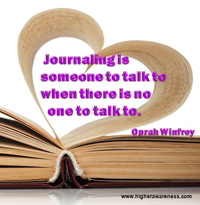“I never travel without my diary. One should always have something sensational to read in the train.” — Oscar Wilde
I posed this question to Patrice and she replied, “That’s easy! A diary has a lock and a tiny key!”
You might remember those diaries from grade school days where you stashed your precious secrets. I suspect your diary has grown up with you to become a journal.

We generally think of a diary as a blank book with dated pages to record daily events. A diary not only stores the facts of our lives, it also invites us to pour out our hearts – our anger, fear or grief or our ecstasy and inspiration.
Really, it’s those emotional bursts that send us straight to our diaries. Why? Because writing about our ups and downs works! It helps us feel better, learn from our experiences and move on.
So if writing in our diaries works so well, why not use it for other reasons? This is where journaling pushes diary writing in exciting new directions.
With journaling, we use prompts like questions, tools, games and challenges to probe our subconscious minds for information that doesn’t easily surface through our normal activities. Because journaling takes us into such new territory, we get great rewards of self knowledge, clarity, healing, creativity and even manifesting what we want. Honestly, journaling brings unlimited benefits. You’ll never run out of treasures to uncover!
I have always said there are no rules when it comes to journal writing. I urge you to put aside any judgements to be accurate, neat, structured and doing it right. This thinking will limit your creativity, intuition, depth and flow.
However, if you want your journal to evolve into a rich resource for you, I would recommend a few simple but important steps when you write:
- Date your pages so you have a way of retrieving important entries and
- Give each entry a title.
I keep my first few pages in my journal empty so I can create an index over time. I list my most insightful and meaningful notes with page numbers or dates so I can quickly review them and integrate them more deeply.
Each of us has our own styles of feeling, thinking and writing. Once you know your style, you will see how journaling tools geared specifically to your style can work so powerfully for you. You can then maximize setting up your journal and using fun tools to give you the best results.
Your journal becomes your ‘go to place’, your ‘diary on steroids’ – where you can create an audit trail of events, healing, ideas that are ready to blossom, insights, how your mind and intuition work, lists and many other things that are important to you.
If you want to find out more about your journal writing style, choose from 50 tools and techniques to maximize your experience, and learn how to set up an effective journaling system with lots of tips and ideas, consider the newly updated “Journaling for Self Empowerment” e-book with 30 days of inspiration and support emails. ()
~ John
“Writing can rescue us from emptiness.” – Patrice Vecchione
“Journal writing is a voyage to the interior.” — Christina Baldwin
